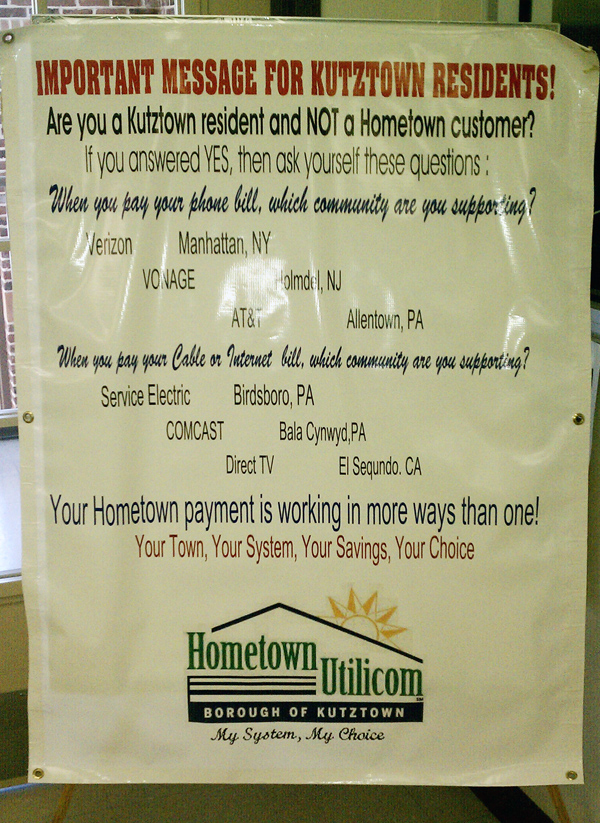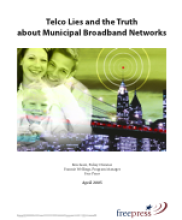
Fast, affordable Internet access for all.

It’s no small feat to plan, deploy, and operate a municipal citywide Fiber-to-the-Home (FTTH) network, but communities are doing it. We’ve put together a Citywide Municipal FTTH Networks list and a map, with quick facts at your fingertips. If your community is considering such an investment, this list can offer a starting point on discovering similarly situated locations to study.
The list is divided by state and each state heading offers a description of any barriers that exist and a link to the statute in question. Under each community, we also included relevant links such as to the provider’s website, coverage on MuniNetworks.org, and reports or resources about the network.
We used four basic criteria to put a community on our list and map:
Share the list far and wide and if you know of a community network that meets our criteria that we missed, please let us know. Contact H. Trostle at htrostle@ilsr.org to suggest additions.
Join Chris in Springfield, Massachusetts for the Community Fiber Networks conference in September. The meet-up is part of Broadband Communities Magazine's Economic Development series; Chris will present at the event. The conference will run September 16 - 18 at the Sheraton Springfield Monarch Place Hotel.
Jim Baller, Conference Chairman and Principal at the Baller Herbst Law Group notes:
During the last fifteen years, thousands of communities across the United States have sought to attract or develop advanced communications networks, recognizing that such networks can provide them and the nation multiple strategic advantages in the increasingly competitive global economy. In virtually every case, fostering robust economic development has ranked at or near the top of the list of considerations motivating these communities.
Broadband Communities chose Springfield because there are multiple projects in the region, including MassBroadband123, Leverettnet, and Holyoke.
You can register online for the event and check out the agenda to plan your weekend.


The Borough of Kutztown, Pennsylvania, with a year-round population around 5,500 that is swelled by Kutztown University, has been on the community broadband map for 10 years. In this informative Gigabit Nation interview, Craig Settles visits with Frank Caruso, IT Director for the Borough of Kutztown.
The interview is embedded below and runs approximately one hour and is sandwiched between a one hour interview with Chattanooga about smart grid economics and an hour interview with Todd Marriot about UTOPIA -- so if you want to hear the portion on Kutztown, skip 60 minutes into the show.

In the interview, Craig and Frank discuss how the municipal network, Home Net, started out of necessity. The community wanted to link their utilities with a telecommunications network and government facilities needed a cohesive option. FTTH became part of the equation later, but was not the main impetus. Kutztown issued RFPs for a new network, but the response was silence. The community investigated the next option - building it themselves.
After several conflicting feasibility studies, the Borough decided to go ahead and build the network with the hope that "if we build it, they (ISPs) will come." Kutztown issued taxable bonds and built their own fiber network. The goal was to provide the infrastructure for government purposes and in the future create real choice for consumers. Again, no ISPs answered the call.
According to Caruso, large providers were not able to accept a business model which created a "middle man" between them and their customers. The only interest from the private market was from a small local telecommunications company that eventually leased a line from the city to expand their footprint for telephone service.
When I visited Hometown Utilicom in Kutztown, Pennsylvania, I snapped this photo of a sign they have posted in their office to remind people how supporting the local network helps the local economy. Not a very good photo, I'm afraid, but it conveys the message.


From the Executive Summary (stats from 2005): The attention of policymakers in both parties is now focused on the question of how to promote competitive broadband markets that will deliver high-speed Internet access to all Americans at affordable rates. It is a difficult problem. Present estimates are that around 30% of US households subscribe to DSL or cable modem service. This compares to over 70% in countries like South Korea. Virtually every rural state remains underserved and uncompetitive. In urban areas, many families are priced out of the market. The telecom and cable kings of the broadband industry have failed to bridge the digital divide and opted to serve the most lucrative markets at the expense of universal, affordable access. As a result, local governments and community groups across the country have started building their own broadband networks, sometimes in a purely public service and more often through public-private partnerships. The incumbents have responded with an aggressive lobbying and misinformation campaign. Advocates of cable and DSL providers have been activated in several state capitols to push new laws prohibiting or severely restricting municipalities from serving their communities. Earlier this year, Verizon circulated a “fact sheet” to lawmakers, journalists and opinion leaders proclaiming the so-called “failures” of public broadband. Many of the statistics come from a widely discredited study of municipal cable TV networks published in 1998. This paper debunks these lies case by case, juxtaposing information direct from the city networks with quotations from the telco propaganda. The results are unequivocal and damning.